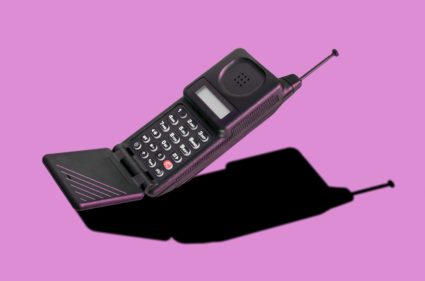
The Alvin Ailey American Dance Theater has just launched a 20-city U.S. tour under its new artistic director Alicia Graf…

Product designer Kaiwei Tang spent years designing smartphones for big companies like Nokia and Motorola. But he started to feel bothered by a single, recurring image: whether it was a restaurant, subway car, or the park, the majority of people he saw were busy staring at their phone, swiping away.
The smartphone, he felt, was no longer a neutral device. Silicon Valley, after all, has admitted that it is engineered to keep people hooked. So Tang, at an tech incubator in 2014, began doing research on what happened when people went without their phones glued to their hands. People experienced an "initial anxiety," Tang said. "They say that there's nothing to do or they're bored…. But after 15 to 20 minutes, they start to pay attention to the buildings, the clouds, the sky, their friends. It was encouraging."
Seventy-seven percent of Americans own a smartphone, according to a 2018 factsheet from the Pew Research Center. A growing body of research suggests owning one comes with costs.
The cost of being always available. The cost of having fragmented conversation. The cost of a rewired brain. The cost of our privacy. The literal, spiraling cost of buying the latest technology. For these and other economic reasons, sales of iPhones and other smartphones have recently plateaued and even declined.
At the same time, some people have gone back to the simpler, less addictive phones used in the late 1990s and early 2000s: the flip phone, the "candybar" phone, and other basic "feature" phones that can only talk and text.
At the incubator, Tang and an artist he met there decided to create a smartphone alternative, a simple phone that could only make calls. They called it the "Light Phone," and intended it to be a "phone away from phone." Tang said most of their customers are like him: "Sick of smartphones, the notifications."
"Sometimes I just want to take a walk down the street or spend time with my girlfriend and family, instead of being bombarded," he said.
Smartphones have been around for more than a decade, but Adrian Ward, an assistant professor at the University of Texas at Austin, who has authored several studies on the cognitive consequences of smartphones, said he believes there has been a lag period for people to notice the negative effects.
"It takes people time to realize that they're personally getting 'more' than they expected from technology — not just productivity tools and instant access to cat videos, but also an attentional black hole," he wrote in an email. That, he added, coupled with rising concern at a societal level, and tech companies who have gotten even better at capturing consumers' attention, may have led to a rising resistance to smartphones and renewed interest in simpler phones.
According to the research firm IDC, sales of basic "feature" phones have recently grown. Some 24.2 million simple feature phones shipped in the U.S. in 2015, almost 2 million more than the year before. In the intervening years, countless writers and journalists have written stories explaining how exchanging a smartphone for a flip phone, at least temporarily, "revolutionized" their life. They expressed sharper focus, a widened social register, and a mind that was free to wander.
WATCH: How to retrain your shrinking attention span
At the same time, a group called "Wait Until 8th" now urges parents to wait until eighth grade before gifting their child a smartphone. Some tech industry players have publicly said they see the dangers of screen time and stringently limit their children's exposure (includes the late Apple CEO Steve Jobs). It's also a parenting philosophy that many parents say they simply can't afford.
In 2018, one story declared the flip phone as "the new protest statement," because it was affordable, more durable, and less distracting. Actors Daniel Day-Lewis and Frances McDormand, along with pop star Rihanna, were reported as being flip phone adopters. It wasn't long before the trend was co-opted for the market.
"The return of the icon," boasts Nokia on its website, announcing its recent re-release of the "banana phone," a yellow slider phone that was popular back in the day and was featured in the 1999 movie "The Matrix." Except now, the device not only allows users to play the retro video game Snake, but also check their Facebook and Twitter, take beautiful photos, and create a mobile hotspot. The banana phone of old, it is not.
The banana phone isn't alone. There's an entire new generation of flip phones that are more like fancy smartphones in disguise. The supposed, imminent return of the Motorola Razr, for example, is rumored to come complete with a foldable screen, a widescreen aspect ratio so people can watch TV without the pesky black bars, and a selfie camera. And it's expected to cost a whopping $1,500, more than almost any smartphone. Samsung, which recently said its profits are expected to drop 60 percent due to a slump in smartphone demand, recently released the W2018, a flip phone that has two touchscreens. The new Huawei Mate X, meanwhile, is being marketed as the world's first 5G foldable AI phone.
These phones aren't solving the problems of smartphone use, but Kostadin Kushlev, an assistant professor of psychology at Georgetown University who has studied the subject for years, said he didn't believe companies should be expected to. He added that some technology gatekeepers are now launching features to limit a smartphone's distractibility, such as the "Do Not Disturb" function, which prevents notifications, and the "Screen Time" app, which allows people to see how much time they're spending on their phone. According to Kushlev's research, the optimal amount of time to be bugged by your phone is getting just three batches of notifications a day. Which raises the question, wouldn't it be easier to just get a cheap flip phone?
Sustain our coverage of culture, arts and literature.